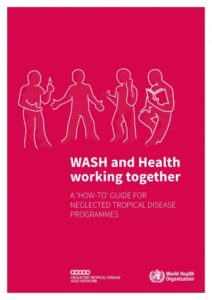Can a toolkit make a difference to WASH and NTDs collaboration?
January 30, 2020
By: Yael Velleman (SCI Foundation) and Leah Wohlgemuth (Sightsavers); WASH Working Group Co-Chairs, Neglected Tropical Disease NGO Network
One year on from the launch of the first-ever practical guide on WASH and NTDs collaboration, the co-chairs of the NNN WASH Working Group reflect on its impact.
A year ago today, Dr. Mwele Malecela, WHO Director for the Department of Control of NTDs, unveiled the first-ever step-by-step guide for building NTD and water, sanitation and hygiene (WASH) partnerships to a crowded auditorium at the London Centre for Neglected Tropical Disease (NTD) Research. “WASH and health working together: A ‘how-to’ guide for Neglected Tropical Disease programmes” is the culmination of more than two years of collaboration between the World Health Organization and the NTD NGO Network (NNN), incorporating real-life program perspectives and tools to improve coordination between the NTD and WASH communities. On this inaugural World NTD Day, the toolkit is celebrating its one-year anniversary and the significant headway made since its launch.
2019 saw a burst of activities to disseminate the toolkit far and wide; it was translated into French and Spanish, transformed into an interactive online version, and featured in two webinars for the NTD and WASH communities. Blogs by WaterAid and the NNN highlighted the mutual benefits of the toolkit to the WASH and NTDs communities, and the toolkit was highlighted in a USAID Water Currents issue on the importance of WASH and NTD integration. Interviews with The Carter Center’s Kelly Callahan, Director of the Trachoma Control Program, and Dr. Wondu Alemayehu, Technical Advisor at The Fred Hollows Foundation, demonstrated the value of the resource in the eyes of those who have worked towards NTD control and elimination for many years. The toolkit also made a splash at a number of WASH and global health convenings, with workshops delivered at Stockholm’s World Water Week, UNC’s Water and Health Conference, and the 10th Annual NNN Conference.
More importantly, however, the approach set out in the toolkit was implemented in a number of countries. Inspired by this resource, the Ethiopian Ministry of Health, which was also a major contributor to the toolkit’s content, developed a national framework to guide all government and non-government stakeholders on resourcing, planning and monitoring joint interventions, along with a woreda-level WASH and NTDs coordination toolkit. Various tools including the situation analysis protocol and planning workshop were also utilized in Benin, Burkina Faso, Cameroon, Côte d’Ivoire, Ghana, Guinea, Kenya, Liberia, Niger, Nigeria, Senegal, Tanzania, Zambia and Zimbabwe. More recently, the Government of Uganda formally adopted the toolkit as a whole and has begun a process of coordination, and adaptation of the toolkit to the national and local context. The toolkit has also informed the design of WASH activities with the UK Aid funded Ascend programme in West and Central Africa, including coordination structures and joint planning processes.
As we look ahead to 2020—with the anticipated launch of the 2030 Global NTD Roadmap and complementary Global Strategy on WASH and NTDs, as well as renewed commitments to be made in Kigali this summer—nothing is clearer: cross-sector collaboration is essential to sustainably beating NTDs. This World NTD Day, we’ll celebrate the progress made in 2019 following the launch of “WASH and health working together”, but know that as a global community, we still have much to do to build successful partnerships. This will mean taking collaboration to the next level, by convening and supporting capacity building initiatives at the regional and national level, by supporting the development of country and local tools, and by documenting the use of the tools to ensure that the toolkit is continuously enhanced to achieve the ultimate aim: end the scourge of NTDs by 2030.
